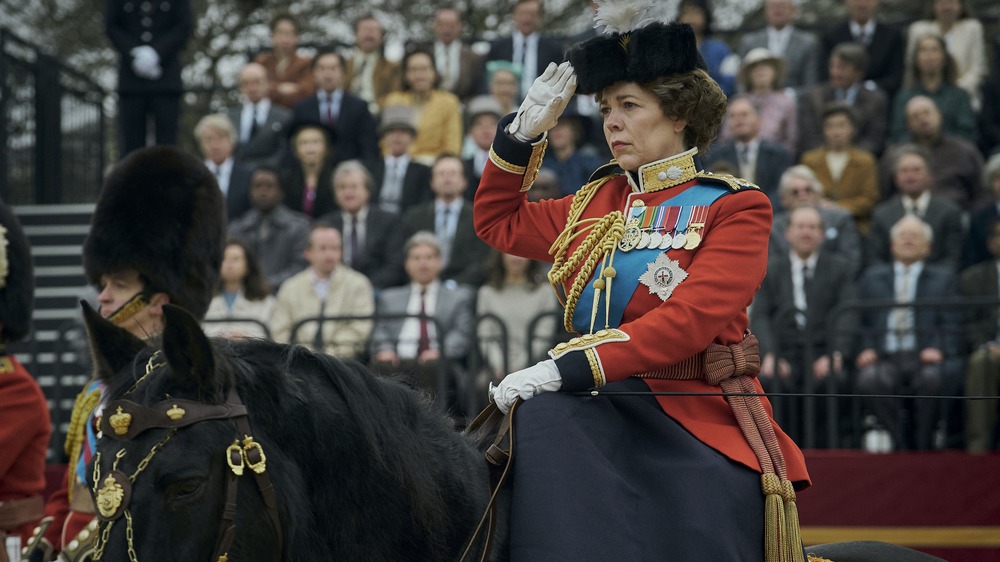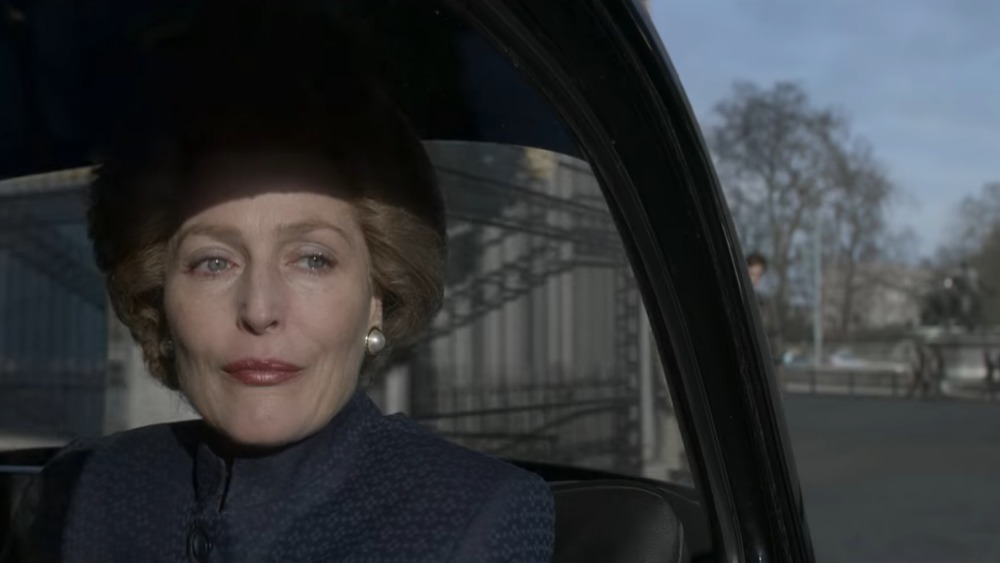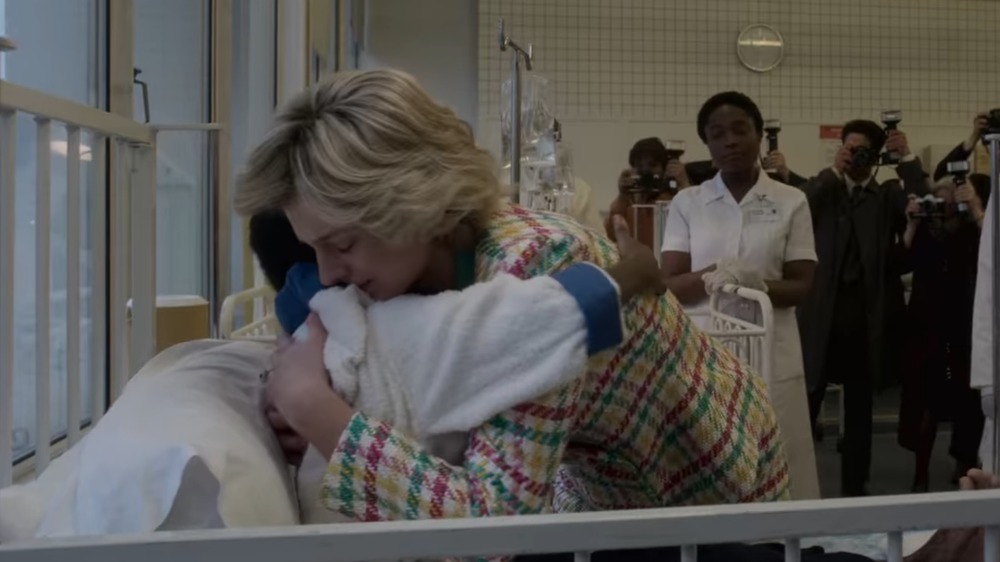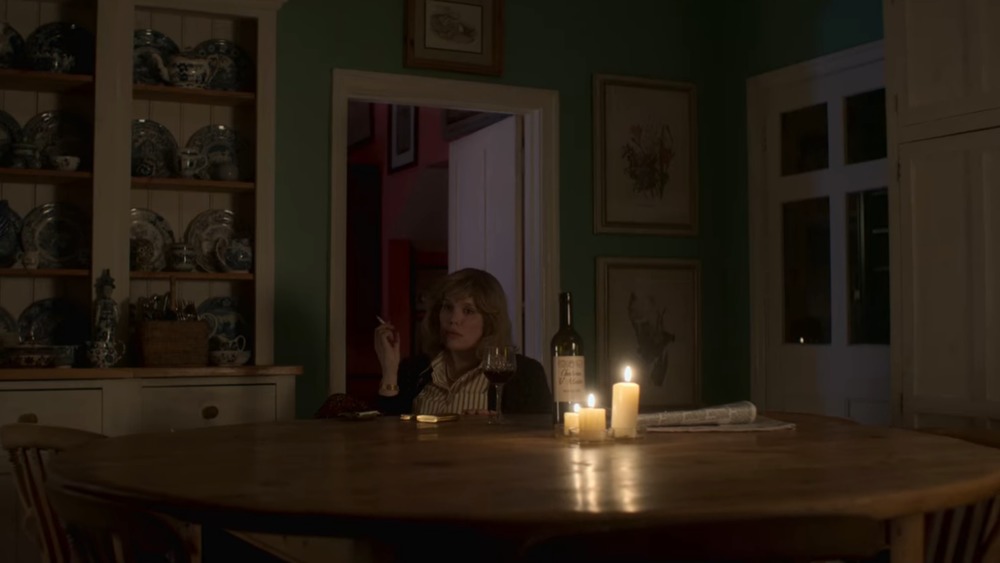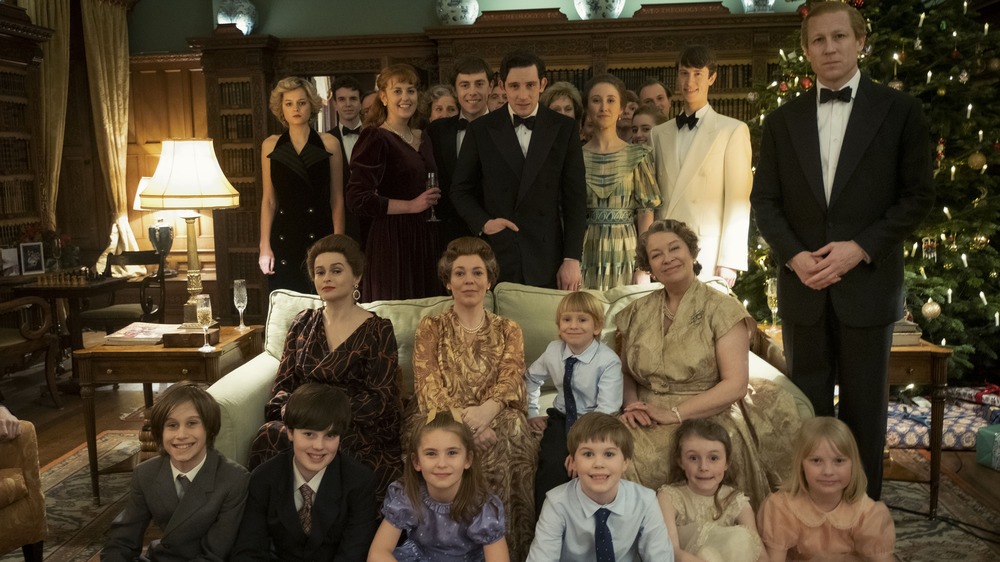The Ending Of The Crown Season 4 Explained
The fourth season of Netflix's acclaimed historical drama The Crown brought Great Britain and its royal family into one of their most tumultuous decades yet: the 1980s. From the reign of the country's first female prime minister, the profoundly controversial Margaret Thatcher (Gillian Anderson), to the rise of Princess Diana (Emma Corrin), the season saw tests to the royals coming from every direction. It also marked a bittersweet meta-moment for the series. When the show eventually returns for its fifth (but not final) season, it will have an all-new cast, meaning the era of Olivia Colman, Helena Bonham Carter, and Tobias Menzies has come to an end.
Of course, anybody familiar with modern British history already had the events of The Crown's season 4 finale spoiled for them. But The Crown isn't a docuseries. It's a fictional look at real figures from history, and while it (mostly) sticks to the facts, the way the show portrays its subjects and the events that shaped them, as well as what it leaves out, is essential to its artistic commentary.
With that being said, here's how the end of an era played out in The Crown's season 4 finale.
A political power play ends Margaret Thatcher's time as prime minister
One of the cornerstones of The Crown's fourth season was the tense relationship between Queen Elizabeth (Colman) and Margaret Thatcher. In the finale, we see Thatcher's tenure as prime minister come to a calamitous end after a powerful former political ally blindsides her by publicly questioning her leadership. When Thatcher meets with Elizabeth as the cracks in her political alliances widen, she is damaged, but still eager to fight on.
However, Elizabeth has watched with pursed lips as Thatcher's harsh economic policies led to spikes in unemployment and mass societal unrest. Previously, she had been content to offer vague tidbits of advice. But now she states plainly, "Power is nothing without authority. And at this moment your cabinet is against you, party is against you, and if the polls are to be believed... the country is against you. Perhaps the time has come for you to try doing nothing for once."
Thatcher steps down and is called to Buckingham palace one last time. Elizabeth informs her that she's awarding Thatcher the Order of Merit, a high and exclusive honor. While Thatcher's policies angered Elizabeth, it seems that she also recognizes the Iron Lady as the only other person in the country with whom she's had the shared struggle of being a woman leader at the highest level. As she pins the superlative to her lapel, Elizabeth tells Thatcher, "Nobody can deny this is a very different country now than the one inherited by our first woman prime minister."
While the show has been largely unflinching in its criticisms of Thatcherism, in the finale, it showcases the ways in which its perspective perhaps differs from that of its principal subject.
Diana establishes herself as the people's princess
While one British public figure waned, another rose to new heights. Elizabeth and Thatcher's prickly relationship served as the season's well of political drama, but the emotional core was the troubled Marriage between Prince Charles (Josh O'Connor) and Diana. Although a pep talk from Elizabeth and Prince Philip (Tobias Menzies) seemed to set the couple off on a new path, it wasn't long before Charles was once again confessing his devotion to Camilla Parker Bowles (Emerald Fennell) and Diana was calling old boyfriends. Both are miserable in the marriage and see no path forward other than separation.
In the finale, Diana makes a solo trip to New York City. She tours Harlem, where adoring masses of people crowd the streets to get a glimpse of her. Even though her erratic behavior made some in the conservative court question her ability to pull off a royal visit alone, the public love Diana's down-to-earth charms and the affection she shows them.
As part of her trip, Diana visits a hospital where juvenile HIV/AIDS patients are being treated. After a doctor explains to her that one of the hardest battles they are facing is the stigma surrounding having basic direct contact with people living with HIV/AIDS, Diana leans in and hugs one of the hospitalized children as press cameras flash all around her and she continues her ascent to becoming the people's princess.
Camilla recognizes that she and Charles are the villains of the fairytale
Diana's moment of compassion is seen as an act that helped shift the public's perception about HIV/AIDS. However, Charles is unable to conceive of it being about anything other than himself. His jealousy over the public's love of Diana comes roaring back, and as usual, he turns to his true love, Camilla.
But while Charles finds Diana's actions to be self-aggrandizing and manipulative, Camilla understands exactly how the public perceives them. The real friction this season hasn't been about whether or not Charles and Diana would survive as a couple, but whether he and Camilla would finally pull the trigger and leave their spouses for each other. After Diana's New York trip, Camilla is more reluctant than ever to scorn the young princess. She explains to the hapless prince that the people love fairytales. "To be the protagonist of a fairy tale, you must first be wronged," she says. "A victim. Which, if we were to become public, we would make her."
In his own selfishness, Charles is unable to understand how his relationship with Diana is viewed by others. He thinks that he, and especially Camilla, have been wronged by the "calculated vulgarity of [Diana's] antics." However, when he joins the family at Balmoral for Christmas, he has the bubble of his ego burst by his own mother.
The family convenes for a Christmas to remember
After Elizabeth dodges a request from Diana to have a heart-to-heart about the collapse of her marriage, she is cornered by Charles, who asks his mother to have compassion for his "suffering." Unfortunately for him, Elizabeth has had enough. After dropping the bomb on Charles that nobody on planet Earth is going to feel bad for him, she elaborates, "They know that you betray your wife and make no attempt to hide it. They know that thanks to you, she has psychological problems... they know you're a spoiled, immature man, endlessly complaining unnecessarily, married to a spoiled, immature woman, endlessly complaining unnecessarily."
In a room on the other side of Balmoral, Philip is having his own moment with Diana. He commiserates with her, as both are outsiders who married into the Windsor family. However, when Diana tells him she wants to leave Charles to end the misery that is their marriage, Philip tries to advise her against it. His pitch is that she's not alone in feeling isolated and unloved in her position as a member of the royal family: "Everyone in this system is a lost, lonely, irrelevant outsider, apart from the one person, the only person, that matters."
It's not exactly a very appealing pitch! As the family gathers for the annual Christmas portrait, everyone smiles, except for Diana. The camera zooms in on her stoic face, and as the season ends, the audience gets the sense that she's not content to join the rest of them in a life as a lost and irrelevant outsider.
